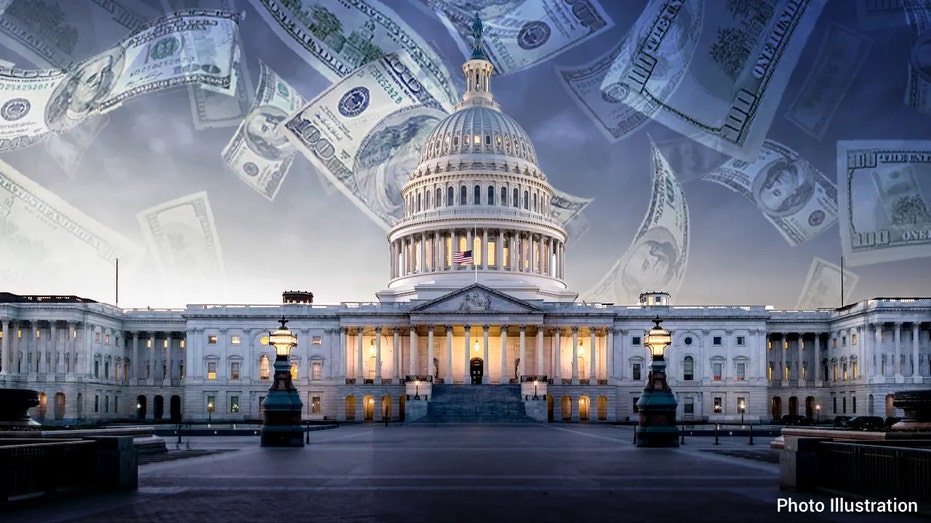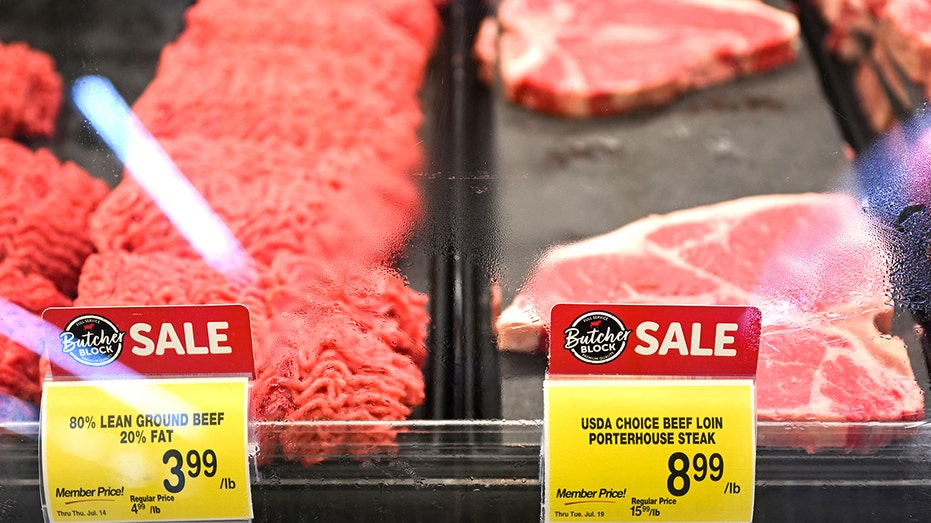Senate Dems pass social spending, tax bill, working from home disparaged and more: Monday's 5 things to know
The Bureau of Labor Statistics is expected to say consumer price index rose 0.2% month-over-month in July
Here are five key things that could impact Monday's trading.
MAJOR WIN FOR DEMS: The Senate Sunday passed the Democrats' social spending and taxation bill after a marathon "vote-a-rama" session that lasted more than 15 hours, marking a major win for the Democratic agenda just over three months before Election Day.
Vice President Harris cast a tiebreaking vote to allow the legislation to pass 51-50.
"I mean, it's the largest package ever for climate, it deals with an energy policy to make sense for this country, reduces the cost of energy, reduces health care costs for millions of Americans, and does it in a way that reduces the deficit and has tax fairness in our code," Sen. Ben Cardin, D-Md., told Fox News Digital. "It’s a great day, and we’re very excited about it."
TRUMP PLEDGES TO CAMPAIGN AGAINST MANCHIN IN WEST VIRGINIA BECAUSE OF SPENDING BILL DEAL

The Schumer-Manchin social spending and tax increase bill cleared the Senate in a 51-50 vote. (Fox News Photo Illustration / Fox News)
"This is a night of triumph for them," Sen. Josh Hawley, R-Mo., told Fox News Digital. "Schumer has had the longest 50-50 Senate in history. And he has managed to get virtually all of their signature priorities through."
The passage of the bill is the culmination of more than a year of intra-party negotiations among Democrats trying to pass a party-line bill. They used a process called budget reconciliation, which allows them to get around the Senate filibuster, to do it.
But even avoiding the filibuster, Democrats still encountered a major hiccup toward the end of their effort to pass it. A drafting issue would have increased taxes on companies worth less than Democrats' intended $1 billion threshold if they were subsidiaries of a firm worth more than that amount.
Sen. John Thune, R-S.D., introduced an amendment to deal with the issue, which cost $35 billion. But his proposal would have been paid for by extending the state and local tax (SALT) deduction cap for one year. That would have complicated passage of the final bill, because many Northeast Democrats detest the SALT cap.
The Senate passed Thune's amendment. But it changed the way to pay for it by using an amendment from Sen. Mark Warner, D-Va., to replace the SALT cap with "a two-year extension of a so-called loss limitation policy." That amendment passed with Harris' help and cleared the way for final passage.
After the last-second drama, Senate Majority Leader Chuck Schumer, D-N.Y., touted the legislation as a major win for the U.S.
"I am confident the Inflation Reduction Act will endure as one of the defining legislative feats of the 21st century," he said.
Initially called "Build Back Better" at the start of talks last year and proposed to cost more than $3 trillion, party moderates like Sen. Joe Manchin, D-W.Va., pushed back on the massive spending. Manchin eventually broke off talks last December, to the frustration of party progressives and Schumer.
But Manchin agreed on a scaled-back version in recent days titled the "Inflation Reduction Act." Manchin lobbied fellow moderate Sen. Kyrsten Sinema, D-Ariz., to get on board, which she did Thursday after some minor changes.
‘SENSE OF BELONGING’: Author Malcolm Gladwell shared his thoughts on returning to the office during a recent appearance on the "Diary of a CEO" podcast.
The "Blink" and "Outliers" author told the host, Steven Bartlett that people should return to the office to regain a "sense of belonging."
"It’s very hard to feel necessary when you’re physically disconnected," Gladwell said. "As we face the battle that all organizations are facing now in getting people back into the office, it’s really hard to explain this core psychological truth, which is we want you to have a feeling of belonging and to feel necessary."
Gladwell acknowledged the hassle of coming to the office, but insisted it was not in employees’ best interest to work from home.
STEPHEN KING SET TO TESTIFY FOR GOVERNMENT IN TRIAL TO BLOCK BERGER OF PUBLISHING GIANTS

Author and columnist Malcolm Gladwell speaks during a Bloomberg Television interview at the Barclays Asia Forum in Hong Kong. (Bloomberg Television/Getty Images / Getty Images)
"[I]f you’re just sitting in your pajamas in your bedroom, is that the work life you want to live?" Gladwell asked. "Don’t you want to feel part of something?"
Gladwell said he was frustrated with the inability of people in positions of leadership to effectively communicate to their employees the importance of returning to the office.
"If we don’t feel like we’re part of something important, what’s the point?" he said. "If it’s just a paycheck, then it’s like, what have you reduced your life to?"
A growing segment of the population has become accustomed to working from home since the new arrangement was first tried out on a grand scale during the COVID-19 pandemic. Now, according to some estimates, a majority of U.S. workers have cited remote work as a major factor in their job consideration.
Data from Employ Inc. in April found that 65% of workers said that remote work or work-from-home (WFH) options impacted their decision to accept or reject a job offer. As many as 40% of respondents said they would take lower pay if it meant working remotely.
BLS REPORTS ON JULY CPI, WHOLESALE INFLATION: On Wednesday at 8:30 a.m. ET, the Bureau of Labor Statistics is expected to say the consumer price index rose a slight 0.2% month-over-month in July. That’s down sharply from June’s 1.3% spike.
On a year-over-year basis, watch for prices to soar 8.7% in July, easing back from June’s much hotter-than-expected 9.1% surge, the highest inflation rate in almost 41 years (since November 1981).
Factoring out volatile food and energy costs, the core consumer price index is anticipated to rise 0.5%, backing off a one-year high of 0.7% in June. Annually, core CPI is forecast to spike 6.1% in July. That would be the highest since April and snap a 3-month streak of slowing growth after March’s 6.5% spike, the highest in almost 40 years (since August 1982).
INFLATION SURGES 9.1% IN JUNE, ACCELERATING MORE THAN EXPECTED TO NEW 40-YEAR HIGH

Ground beef and steak for sale at a grocery store on July 13, 2022, in Redondo Beach, California. (PATRICK T. FALLON/AFP via Getty Images / Getty Images)
On Thursday, BLS will report wholesale inflation data for July. The producer price index is expected to rise 0.3% month-over-month according to Refinitiv forecasts, well below June’s 1.1% spike and a record 1.6% surge in March (series goes back to December 2009).
Year-over-year, prices paid by wholesalers are anticipated to jump 10.4% in July, trailing June’s hotter-than-expected 11.3% surge which was the second highest on record after an 11.6% spike in March (the final demand index goes back to November 2010).
Exclude food and energy costs, core producer prices are anticipated to rise 0.4% monthly in July, matching June’s increase. Year-over-year, look for core PPI to jump 7.7% in July, the fourth month of slowing growth after a record 9.6% surge in March (data go back to April 2011).
EARNINGS WINDING DOWN: The pace of second-quarter earnings season slows this week, with only one Dow component (Disney on Wednesday) and 23 members of the S&P 500 scheduled to post results.
These include handful of key media names, including News Corp. on Monday afternoon, with Fox Corp. and Disney reporting on Wednesday.
| Ticker | Security | Last | Change | Change % |
|---|---|---|---|---|
| NWSA | NEWS CORP. | 22.74 | +0.24 | +1.07% |
| FOX | FOX CORP. | 56.75 | -1.60 | -2.74% |
| DIS | THE WALT DISNEY CO. | 107.13 | -1.57 | -1.44% |
Close to 90% of the companies in the S&P 500 have reported April-through-June results, with earnings and revenue numbers coming in far ahead of lowered expectations.
JOBS REPORT: U.S. stocks finished Friday close to flat after a surprisingly strong jobs report cast doubt on the Federal Reserve being able to shift away from interest-rate increases anytime soon.
Investors had come to widely believe that the Fed could pivot to cutting interest rates as early as the first half of 2023, given signs of cooling activity across the economy. That would have been a balm for markets, which have tumbled this year as the Fed has swiftly raised interest rates to combat stubbornly high inflation.
But Friday's data showed the labor market was doing anything but cooling. The labor market added 528,000 jobs in July -- more than doubling what analysts had estimated and returning payrolls to their pre-pandemic level.
Meanwhile, the unemployment rate fell to 3.5%, near historic lows. That left investors with a mixed picture: A key pillar of the economy remains strong, which should be good news for markets.
CLICK HERE TO READ MORE ON FOX BUSINESS
But strong data means the rate increases that have sent stock and bond prices lower this year aren't likely to go away anytime soon. It also raises questions about whether stocks can continue their recent comeback.




















